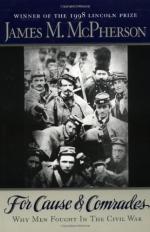
|
| Name: _________________________ | Period: ___________________ |
This test consists of 15 multiple choice questions and 5 short answer questions.
Multiple Choice Questions
1. When discussing the movie "Gettysburg" and the novel "The Killer Angels," McPherson mentions which man who won the medal of honor for defending Little Big Top?
(a) Charles Evans Roberts.
(b) William E. Miller.
(c) Henry J. Minnigh.
(d) Joshua Lawrence Chamberlain.
2. As McPherson discusses religion's role in the Civil War, he notes that a lieutenant from New Jersey who fought in the conflict was what religion?
(a) Mormon.
(b) Quaker.
(c) Jewish.
(d) Atheist.
3. Soldiers from all BUT WHICH of the following states are mentioned in the discussion of green recruits who wanted to prove their manhood through battle?
(a) Massachusetts.
(b) Indiana.
(c) Tennessee.
(d) Illinois.
4. During the battle of Fair Oaks, Captain Oliver Wendell Holmes, Jr., swore he would shoot the first man who ran, in which of the following regiments?
(a) 20th Massachusetts.
(b) 12th Georgia.
(c) 21st Texas.
(d) 5th Arkansas.
5. After the story from the soldier who experienced the glaze of war during the battle at Gaines Mill, McPherson notes that another term for this phenomenon is what?
(a) Military insanity.
(b) Combat narcosis.
(c) Enraged glory.
(d) Battle craze.
6. After the battle of Fredericksburg, which famous writer visited his brother, a lieutenant in the 51st New York, after the man had been wounded?
(a) Henry James.
(b) John Steinbeck.
(c) Upton Sinclair.
(d) Walt Whitman.
7. During the discussion of religion, from which state was the private who wrote in 1861 that he wanted to put down the rebellion but hoped the war would end without him having to kill anybody?
(a) Massachusetts.
(b) Illinois.
(c) Indiana.
(d) Pennsylvania.
8. During the Seven Days battles, the 83rd Pennsylvania suffered what percentage of casualties?
(a) 98%.
(b) 25%.
(c) 50%.
(d) 75%.
9. When McPherson says that grousing about war has long been a soldier's privilege, he notes an officer from which state who wrote that these "soldiers will fight like bull dogs"?
(a) Georgia.
(b) Massachusetts.
(c) Virginia.
(d) Pennsylvania.
10. During the discussion of leadership, a captain in the 1st North Carolina told his daughter ___________ that he would not be a tree dodger.
(a) Annie.
(b) Mary
(c) Caroline.
(d) Lily.
11. During his visit to the four Civil War battlefields near Fredericksburg, McPherson thinks about the fighting that happened on May 12, 1864; for how many hours did the battle last?
(a) 4.
(b) 9.
(c) 27.
(d) 18.
12. In July 1861, what battle caused Northern volunteers to flock to the army?
(a) Shiloh.
(b) Chancellorville.
(c) Gettysburg.
(d) Bull Run.
13. A private from which state recounted an amazing amount of energy while describing the battle of Gaines Mill?
(a) Texas.
(b) Georgia.
(c) Pennsylvania.
(d) Tennessee.
14. In 1864, an officer in which regiment wrote of a successful attack on Confederate lines, defending the Weldon Railroad near Petersburg?
(a) 12th New York.
(b) 15th Delaware.
(c) 2nd Iowa.
(d) 9th Michigan.
15. From which state was the soldier who felt that religion was what made brave soldiers, during the discussion of Civil War faith?
(a) Pennsylvania.
(b) Maryland.
(c) Massachusetts.
(d) Ohio.
Short Answer Questions
1. In the discussion of religious fatalism, what is described as the most dangerous position in the infantry?
2. As McPherson describes how soldiers on both sides were spoiling for a fight, he mentions an expression denoting exciting experiences: see the _________?
3. In the discussion of the officers' views on training, which of the following did a captain in the 85th New York NOT believe would get men to fight well?
4. By 1863, McPherson states, trouble and sorrow in the dis-United States was almost beyond calculation, as the war had claimed how many lives?
5. As the excitement for battle raced across the country, the governor of Ohio said he could not send the requested thirteen regiments but would send how many?
|
This section contains 563 words (approx. 2 pages at 300 words per page) |

|




